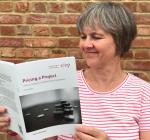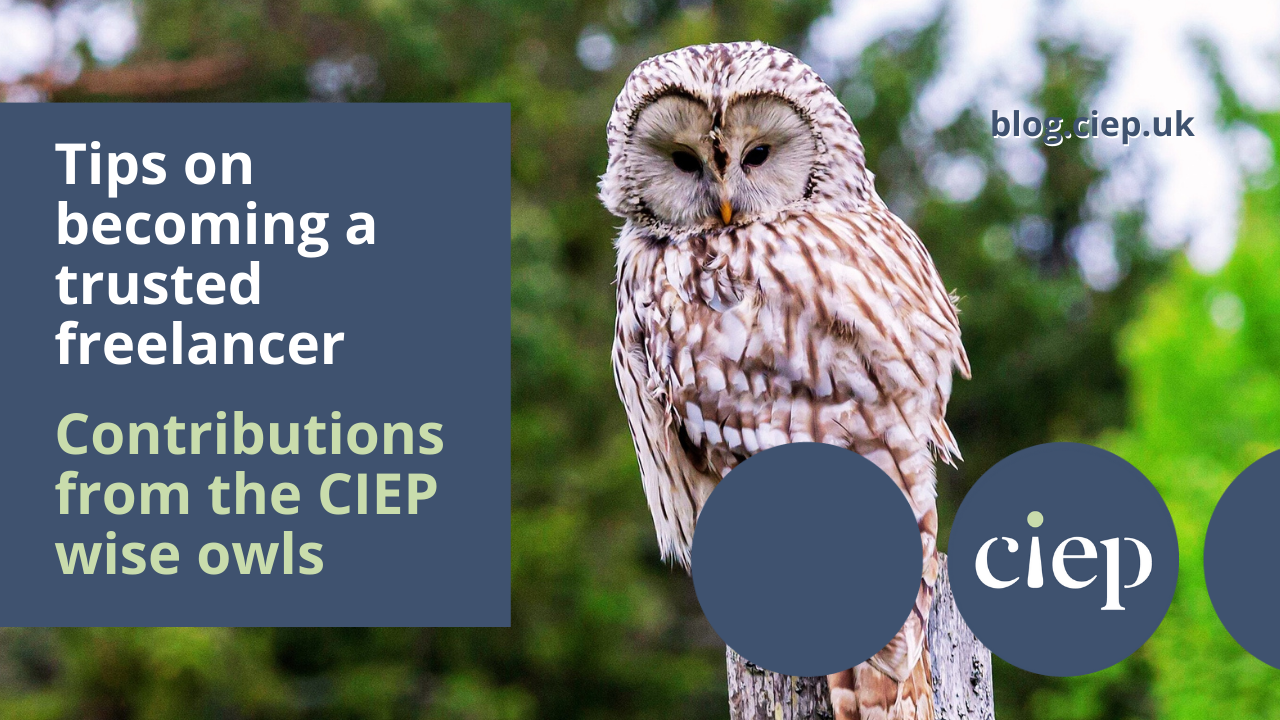In this post, our parliament of wise owls (all Advanced Professional Members) consider the qualities that turn someone into a trusted freelancer. What keeps clients coming back to them time and time again?
 Sue Littleford
Sue Littleford
Some 95% of my work is for repeat clients. I think that boils down to three things: ability, reliability and understanding the client’s needs. I’m proud of this testimonial from a project manager: ‘All safely received … And all immaculately presented as ever. I like getting jobs back from you as it makes my life so easy.’ I’ve done 39 books so far for this particular client, because, aside from the actual quality of my copyediting, the handover is orderly and complete, and provides what that client wants from me. I don’t miss deadlines and I do flag up emerging problems as early as possible.
It also helps to be organised and easy to work with, and pleasant in your dealings – who wants to work with high drama and flapping about, when you can have peace and quiet?
You don’t have to be a doormat to have repeat clients. With all of mine, I still negotiate on deadlines and on price according to the project. Only today, as I draft this, I agreed with another client an extra week on the deadline for my 23rd book for them. One of the project managers in that same client is also now looking out for books for me on particular subjects rather than sending them out to several freelancers simultaneously to see who’s available. The benefits of becoming a trusted freelancer are manifold.
If you pay attention to your customer service as much as to the quality of your editing or proofreading, you’ll be in a good place to get repeat work. I’m a great proponent of using your imagination in customer service to put yourself in your client’s shoes and, as you can see, my own clients like the results.
Jacqueline Harvey
I’ve been copyediting for over 30 years and almost all my publisher clients have been regulars. What makes them come back to offer me another book? I guess it’s because they liked what I did the last time or on various projects over the years.
A trusted freelancer must at the very least be competent. They need to have an eye for detail, a good understanding of the language, a sense of how a reader will respond to a text, good judgement and a broad general knowledge. A client wants a freelancer they can trust to do a good job and to do it within the agreed time frame.
When I accept a job, I make sure that I set aside enough time for it and complete it by the deadline. I also keep my client informed of the work’s progress and of any problems that may arise. I generally get on with the work fairly independently, but raise questions if I’m unsure about anything or if something unexpected crops up. If I can’t meet a deadline for a good reason (eg the work is taking longer than anticipated), I let them know as soon as possible and we discuss how to proceed: it may be possible to tweak the schedule or I may be able to put in extra hours to finish it on time.
Good communication and courtesy go a long way to sustaining a working relationship, and that goes for my relationship with the author too. I try to approach each text with respect and sensitivity, and to be ready to explain or justify my edits – with reference to style guides if necessary. Some authors may need to be reassured that I am there to help them prepare their work for publication rather than to rewrite it or to censure them for spelling or grammatical mistakes.
In essence, do the job well, keep to deadlines, communicate, and you should gain the experience necessary to become a trusted freelancer.
 Sue Browning
Sue Browning
I think this depends on the type of client. All clients will appreciate you sticking to an agreed timescale, but this is especially true of publishers, where your work is part of a chain of tasks. Here I suspect that meeting deadlines is the most important factor in keeping them coming back to you time after time. Beyond that, communication is important (especially if you know you are going to miss that deadline), as is working to the brief and doing a good enough job. Being easy to work with also helps. Publisher project managers are often juggling multiple projects, and don’t always have their eye on your particular ball, so keep questions concise and suggest solutions to problems to help them out.
Having a reputation for reliability works both ways – if a publisher knows you will deliver at the agreed time and that you will do a thorough job, they are more likely to stretch deadlines to fit your availability and cut you some slack if something goes wrong.
With independent authors, I find that friendliness and flexibility are key. Communication is even more important, as these clients don’t always know what to expect of an edit, so I tend to explain more, so they come to trust that I get what they are trying to achieve. One of my fiction regulars even says he comes back for the comments that I leave when editing his novels, and the academic authors I work with know I understand the pressures of university life and will always try to fit their invariably last-minute paper in, even if I’m busy. So I’d say don’t be afraid to be yourself – you can be professional and friendly, authoritative and relaxed, serious and silly.
Michael Faulkner
In my experience the first two requirements for winning repeat business, perhaps unsurprisingly, are to do the job right and do it on time!
A close third is to introduce trust and reassurance into the relationship early on – give your credentials due prominence in correspondence, yes, but level up the relationship (don’t talk up your amazing skills and don’t be deferential either); offer a free sample; only insist on a formal contract for good reason (the alternative, of covering the main things in an exchange of emails, is normally fine); don’t get hung up on deposits; be responsive; where payment is staged, make sure the client knows the final tranche of work will go out before the final invoice; and reassure the client that you will be there to help should issues arise after the project has been put to bed.
Finally, I find it pays enormous dividends, both for you and the client, if you can make a project fun. Don’t be afraid to be a little irreverent. Believe it or not, this is possible even in my specialty, which is law. Obviously you have to get a feel for the client’s sense of humour (or lack of one, which is fine) and not become a pain, but a client who smiles a lot and laughs a few times will want more of the same because, well, life and the evening news …
 Melanie Thompson
Melanie Thompson
Being a trusted freelancer is no different from being a trustworthy person in any other sphere. Fundamentally it’s about doing what you have been asked to do while keeping the needs of the other party in mind. For editorial freelancers (and pretty much any other aspect of life) this depends on clear communications. Here are my seven steps to successful freelancing:
- ensure that you understand what is expected of you, and your client knows what you will/can’t achieve
- be upfront about any constraints (I can’t deliver by Thursday, but I can deliver by Friday)
- be honest about costs – be prepared for a little flexibility but remember that it works both ways
- keep in touch during a project, just enough to provide reassurance that the job is in safe hands
- if you encounter a problem of any kind, don’t stick your head in the sand – take action straight away
- be accessible and willing to give a little free-of-charge consultancy now and then
- pay it forward – if you can’t take on a job, offer to help find some other trustworthy freelancer to help out.
That all boils down to ‘be a nice human’.
But there are times when being ‘trusted’ can mean being ‘taken for granted’, so take care not to undervalue yourself. Being a ‘trusted freelancer’ for one client should not have a detrimental impact on your wellbeing, or your ability to be a ‘trusted freelancer’ for other clients.
 About the CIEP
About the CIEP
The Chartered Institute of Editing and Proofreading (CIEP) is a non-profit body promoting excellence in English language editing. We set and demonstrate editorial standards, and we are a community, training hub and support network for editorial professionals – the people who work to make text accurate, clear and fit for purpose.
Find out more about:
Photo credits: owl by Erik Karits on Pexels.
Posted by Eleanor Smith, blog assistant.
The views expressed here do not necessarily reflect those of the CIEP.

